|
|
|
Sort Order |
|
|
|
Items / Page
|
|
|
|
|
|
|
| Srl | Item |
| 1 |
ID:
186605


|
|
|
|
|
| Summary/Abstract |
The ASEAN Intergovernmental Commission on Human Rights (AICHR) is often regarded unfavourably, depicted at best as irrelevant in the battle to promote and protect human rights in Southeast Asia, and at worst, complicit in the abuse of human rights by its silence in the face of the region's human rights' tragedies. While AICHR has many limitations, we regard it as a work-in-progress, evolving as it was always meant to. To understand this evolution, we conceive of AICHR as a participatory space in which contestation of what AICHR can, and cannot, do is being undertaken by its Representatives. This contestation includes exposing its secretive face of power by revealing: the space human rights can be discussed in; who can participate and who is excluded in this discussion; and how malleable the norms that operate within this space are to change. The latter aspect of contestation engages with the thorny ‘problem’ of consensus. We argue that the presence of Representatives from outside of government has introduced a desire in AICHR for change; a dynamism that makes it a participatory space witnessing contestation that has the potential to enable AICHR to evolve. A space, therefore, that for all its shortcomings is worth watching.
|
|
|
|
|
|
|
|
|
|
|
|
|
|
|
|
| 2 |
ID:
137430
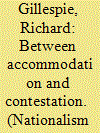

|
|
|
|
|
| Summary/Abstract |
The recent emphasis placed by several mainstream nationalist parties in Europe on sovereignty objectives invites analysis of the drivers behind this phenomenon. Their evolution is characterized by a complex set of dynamics that influences their options when faced with strategic decisions over participation in an existing state and/or challenging it by pressing for statehood. Spain constitutes a major laboratory for studying such dynamics owing to a diverse range of nationally- oriented parties. The experiences of the Basque Country and Catalonia show the continued relevance of center-periphery cleavages, especially when aggravated by European and global pressures and constraints, but party positioning between accommodation and sovereignty politics is influenced too by changing relationships between Basque and Catalan nationalist elites and civil societies and between mainstream nationalist parties and their direct competitors within party systems.
|
|
|
|
|
|
|
|
|
|
|
|
|
|
|
|
| 3 |
ID:
145513
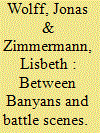

|
|
|
|
|
| Summary/Abstract |
In studying the global spread and implementation of liberal norms, scholars have moved from linear notions of norm diffusion and promotion to an emphasis on norm contestation. Contestation by the supposed beneficiaries and addressees has taken centre stage in both research on the norms that underpin global governance and in studies on democracy promotion and liberal peacebuilding. While the impetus of this scholarship is normative – to overcome the taken-for-granted nature of liberal norms – the concept of contestation itself is mainly used with an analytical interest. Yet, as we show in this article, contestation also comes with – oftentimes implicit – normative connotations. Focusing on the seminal work of Milja Kurki, Oliver Richmond, Antje Wiener, and Amitav Acharya, we reconstruct these normative connotations. It turns out that the normative take on contestation is fairly conventional in all four approaches. Contestation is largely seen as a means to enable dialogue, as illustrated by Acharya’s metaphor of the Banyan tree. Fundamental conflicts over liberal norms (‘battle scenes’) are either not considered or seen as normatively undesirable. As a way forward, we propose a typology that enables scholars to empirically analyse contestation in its different expressions and suggest two strategies to normatively assess practices of contestation.
|
|
|
|
|
|
|
|
|
|
|
|
|
|
|
|
| 4 |
ID:
164463


|
|
|
|
|
| Summary/Abstract |
Following the attacks of 9/11, the United States adopted a policy of torturing suspected terrorists and reinterpreted its legal obligations so that it could argue that this policy was lawful. This article investigates the impact of these actions by the United States on the global norm against torture. After conceptualizing how the United States contested the norm against torture, the article explores how US actions impacted the norm across four dimensions of robustness: concordance with the norm, third-party reactions to norm violations, compliance, and implementation. This analysis reveals a heterogeneous impact of US contestation: while US policies did not impact global human rights trends, it did shape the behavior of states that aided and abetted US torture policies, especially those lacking strong domestic legal structures. The article sheds light on the circumstances under which powerful states can shape the robustness of global norms.
|
|
|
|
|
|
|
|
|
|
|
|
|
|
|
|
| 5 |
ID:
181170
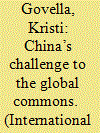

|
|
|
|
|
| Summary/Abstract |
It is often predicted that rising powers such as China will seek to reshape the international order as they gain influence. Drawing on comparative analysis of the maritime and cyber domains, this article argues that China poses a challenge to the global commons because its actions reflect a pragmatic focus on national interest that that disrupts more collaborative conceptions of their governance. However, instead of directly rejecting existing regimes, China has pursued a mixed strategy of complying when these regimes confer benefits and employing contestation or subversion when they conflict with its strategic aims. In particular, China has used contestation and subversion to push for the enclosure of the maritime and cyber domains, extending ideas of sovereignty and territoriality to them to varying extents. While the relatively well-institutionalized nature of maritime governance has limited China’s focus to the application of specific rules in areas where it prioritizes sovereign control, the embryonic status of the cyber regime has enabled China to call into question the fundamental definition of cyberspace as a global common. Subversion has also allowed China to accomplish strategic goals through ‘gray zone’ tactics, resulting in increased conflict below the level of war in both domains.
|
|
|
|
|
|
|
|
|
|
|
|
|
|
|
|
| 6 |
ID:
192167
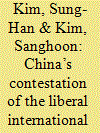

|
|
|
|
|
| Summary/Abstract |
The concept of ‘revisionism’ has caught the attention of international relations scholars amid intensifying rivalry between the United States and China. It is a trademark of rising powers, and China was likewise expected to become a revisionist power, intent on changing the status quo. However, history tells us that not all rising powers necessarily become revolutionary states, seeking to overturn the prevailing order and replace it with another through hegemonic wars. This paper presents a novel understanding of revisionism by distinguishing between strategic ‘contestation’ and ‘challenge’. In the context of declining unipolarity, a dissatisfied rising power will contest the rules and principles of issue-specific regimes and demand legitimate adjustments that better reflect the new distribution of power. A challenge emerges when demands are rejected, and a contestation leads to ‘deconcentration’ and ‘delegitimation’ of the established order. The establishment of the AIIB can be examined as an example of contested multilateralism that falls short of a challenge. This paper concludes that China is ‘contesting’, not ‘challenging’ the liberal international order and suggests a set of countermeasures that the U.S. can think of: selective accommodation, reinforcement of alliances and partnerships, and overcoming domestic challenges such as populism that undermine the liberal values, constitutive of the liberal international order.
|
|
|
|
|
|
|
|
|
|
|
|
|
|
|
|
| 7 |
ID:
129632
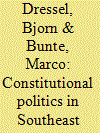

|
|
|
|
|
| Publication |
2014.
|
| Summary/Abstract |
Over the last twenty-five years the constitutional landscape of Southeast Asia has changed tremendously. As in the rest of world, states in the region are dramatically alerting their constitutions, often putting in place institutional safeguard for individual rights, such as constitutional court and human right commission. Yet despite the numerous formal changes, actual constitutional practice in the region has been highly uneven. Four areas are particularly contested: constitutional drafting and design; individual and religious rights. The role of the military in constitutional politics; and the rule of law, court and justice. How states in Southeast Asia resolve unfolding conflicts in these four areas will be critical to how constitutionalism evolves in the region. Replacing traditional legal scholarship with a new perspective on how constitutional politics are contested in the region, this article seeks to advance the unfolding constitutionalism trajectories and assessing whether countries in the region are actually deepening constitutional practice in a Western liberal sense or whether the model that seems to be emerging is quite different.
|
|
|
|
|
|
|
|
|
|
|
|
|
|
|
|
| 8 |
ID:
151646
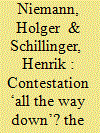

|
|
|
|
|
| Summary/Abstract |
The meaning of norms is empirically contested. Supposing an inherent instability of norm meaning, contestation, therefore, represents a fundamental conceptual challenge to the mainstream view on norms as shared understandings. By offering a grammatical reading of Antje Wiener’s approach to contestation, we examine how norm research addresses this challenge to its theoretical core assumption. We argue that the grammar of Wiener’s approach, despite its reflexive starting point, ultimately reintroduces an understanding of norms as facts and leads to a normative ‘politics of reality’. This effectively turns contestation into a disruption of the ‘normal’ state of norms. Demonstrating the challenges of theorising norms with rather than against contestation, the article concludes that norm research has yet to find ways to account for contestation ‘all the way down’ in order to sustain norms as a productive analytical concept in IR.
|
|
|
|
|
|
|
|
|
|
|
|
|
|
|
|
| 9 |
ID:
185245
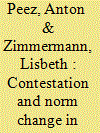

|
|
|
|
|
| Summary/Abstract |
Elephants and whales took center stage in the environmental movements of the 1980s. As flagship species, they were the poster children of global initiatives: international ivory trading and commercial whaling were banned in the 1980s in the context of the Convention on International Trade in Endangered Species of Wild Fauna and Flora (CITES) and the International Whaling Commission (IWC), respectively. While the conservation of both species is contested, we observe a change of existing norms in one case but not in the other: A moratorium on commercial whaling remains in place. Meanwhile, a limited shift to sustainable use regarding ivory was passed in 1997/2000. We ask why norm change occurred in one case but not the other, given their similarities. We argue that the difference can be explained by the perceived legitimacy of the claims of norm challengers using arguments of “affectedness” and the breadth of issues covered by CITES. In contrast, other factors commonly discussed in norms research do not explain this puzzle: the relative power and strategies of norm advocates and challengers, and the degree of legalization. This shows the interplay of discursive aspects and concrete institutional opportunities for norm change, even in the face of otherwise inopportune conditions.
|
|
|
|
|
|
|
|
|
|
|
|
|
|
|
|
| 10 |
ID:
178552
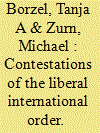

|
|
|
|
|
| Summary/Abstract |
The 1990s saw a systemic shift from the liberal post–World War II international order of liberal multilateralism (LIO I) to a post–Cold War international order of postnational liberalism (LIO II). LIO II has not been only rule-based but has openly pursued a liberal social purpose with a significant amount of authority beyond the nation-state. While postnational liberal institutions helped increase overall well-being globally, they were criticized for using double standards and institutionalizing state inequality. We argue that these institutional features of the postnational LIO II led to legitimation problems, which explain both the current wave of contestations and the strategies chosen by different contestants. We develop our argument first by mapping the growing liberal intrusiveness of international institutions. Second, we demonstrate the increased level and variety of contestations in international security and international refugee law. We show that increased liberal intrusiveness has led to a variety of contestation strategies, the choice of which is affected by the preference of a contestant regarding postnational liberalism and its power within the contested institution.
|
|
|
|
|
|
|
|
|
|
|
|
|
|
|
|
| 11 |
ID:
184113


|
|
|
|
|
| Summary/Abstract |
The article explores the evolving positions and negotiation strategies of the EU and its member states regarding lethal autonomous weapon systems (LAWS). Specifically, it traces the proceedings around the UN disarmament forum Convention on Certain Conventional Weapons (CCW) from 2013 to 2020. Embedded in the norm contestation literature, the empirical section draws upon semi-structured interviews as well as document analysis. We find that, despite the absence of a CFSP position on the matter, the EU and key member states have been instrumental in shaping the discussions. However, the role of the EU is constrained due to double contestation. First, at the level of member states contestation persists on what is the appropriate regulatory framework (hard or soft law). Second, contestation is also exerted towards the EU by some member states who contest the EEAS’s involvement. Some are conscious that presenting an “EU position” might constrain their ability to build global coalitions. Others do not want the EU to interfere with their national sovereignty on such a critical security issue. While these two elements work against a common EU position, we also observe a window of opportunity for the EU. Notably, the EU can strengthen the CCW by funding the forum structures and secretariat, which could become an important body in the implementation of foreseeable agreements.
|
|
|
|
|
|
|
|
|
|
|
|
|
|
|
|
| 12 |
ID:
168878
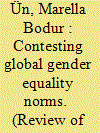

|
|
|
|
|
| Summary/Abstract |
Over the past two decades, constructivist International Relations (IR) scholars have produced substantial knowledge on the diffusion and adoption of global norms, emphasising the role of Western norm entrepreneurs in constructing and promoting new norms to passive, generally non-Western, norm takers. An emergent literature on norm dynamics unsettles this narrative of linear progress, highlighting the agency of diverse actors, including the agency of non-Western norm entrepreneurs, in normative change. This article contributes to this recent norm research by exploring the normative agency of local actors in the Turkish context, who have actively engaged in normative contestation over the meaning of gender equality. More specifically, the article reveals the crucial role of a pro-government, conservative women's organisation in subverting global gender equality norms and in promoting a local norm of ‘gender justice’ as an alternative. The article furthers research on norm contestation by analysing the discursive strategies and justifications local norm makers have adopted in the Turkish context upon encountering norms that challenged their normative beliefs and practices. Finally, the article critically engages with postsecular feminism, highlighting the agency of a religiously informed, conservative women's organisation as a non-Western norm entrepreneur.
|
|
|
|
|
|
|
|
|
|
|
|
|
|
|
|
| 13 |
ID:
180559
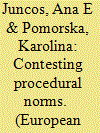

|
|
|
|
|
| Summary/Abstract |
While there is increasing evidence in the literature of politicisation in the area of European foreign policy, we know less about how this has affected the dynamics of cooperation among EU member states and, specifically, the procedural norms that govern this policy. This article is concerned with how politicisation and contestation manifest at the micro-level and how they might shape everyday EU foreign policy negotiations. It seeks to establish to what extent politicisation – resulting from the emergence of a new political cleavage centred around issues of identity and supranational integration – has driven normative contestation within EU foreign policy negotiations and whether this has led to the erosion of long-standing procedural norms in European foreign policy. Our findings suggest that despite CFSP Council committees being an institutional arena, characterised by intergovernmental, relatively insulated, and technical decision-making, current processes of politicisation linked to the rise of populism and the increasing transfer of authority to the EEAS have increased contestation of norms within this setting. However, procedural norms have remained relatively resilient to these challenges.
|
|
|
|
|
|
|
|
|
|
|
|
|
|
|
|
| 14 |
ID:
190913
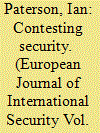

|
|
|
|
|
| Summary/Abstract |
The security-migration nexus is ubiquitous throughout Europe and beyond. An avalanche of scholarship has explored the construction of migration as a security threat in general and, in the UK, the creation of the ‘hostile environment’ in particular – the problematic nature of each being well documented. Yet, far less attention has been paid to activities that contest this process. Deploying Balzacq's four modalities of contestation – desecuritisation, resistance, emancipation, and resilience – this article addresses the imbalance, exploring how asylum and refugee sector NGOs engage in and contest security-migration politics. Using Scotland (2018–19) as an illustrative case and analysing discursive and predominantly non-discursive activities, findings demonstrate that NGOs are successfully contesting the security-migration nexus in Scotland across four principal categories, supporting the ‘surviving’ and ‘thriving’ of asylum seeker and refugee communities, problematising previous conceptualisations of ‘UK’ asylum and refugee politics, with implications extending globally. The article helps refine the theorisation of contestation, demonstrating first, the need to move beyond studies of ‘desecuritisation’, with consequences for understandings of ‘success’ in securitisation, and second, the potential blindness of single-modality studies to vital, meaningful contestation, resulting in the production of less comprehensive visions of the security world.
|
|
|
|
|
|
|
|
|
|
|
|
|
|
|
|
| 15 |
ID:
164462
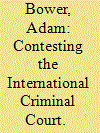

|
|
|
|
|
| Summary/Abstract |
The International Criminal Court (ICC) is the centerpiece of an expanding international norm of nonimpunity, which holds that all individuals should be equally subject to accountability for atrocity crimes. Despite rapid institutional growth, the ICC faces a number of challenges, including enduring resistance to the prosecution of senior state officials. Over the past decade, a number of African states have attempted to suppress ICC cases against Sudanese President Omar al Bashir and Kenyan President Uhuru Kenyatta and enshrine formal exemptions from ICC jurisdiction for sitting Heads of State. In this article, I focus on the dynamics and impact of contestation in a highly institutionalized environment. The ICC is embedded within a dense network of overlapping legal rules and norms and, as a consequence, debates over its operation and legitimacy are primarily undertaken via the distinctive discourses and practices of international law. I argue that, despite often vociferous challenges, contestation surrounding Bashir and Kenyatta has not led to an erosion of the nonimpunity norm because challenges have been largely conducted through modes of “applicatory contestation” that are less damaging to the foundational validity of the norm. Legalization has thus played a dual role, providing strategic justifications for attempts to narrow the scope of nonimpunity, but also empowering counter-contestation by pro-norm constituencies.
|
|
|
|
|
|
|
|
|
|
|
|
|
|
|
|
| 16 |
ID:
185792
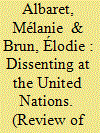

|
|
|
|
|
| Summary/Abstract |
The Venezuelan participation in the United Nations Security Council (UNSC) in 2015 and 2016 was expected to be a challenge for the institution, as the Maduro government adopted controversial positions at the General Assembly (UNGA). However, Venezuela contestation line did not appear clearly at the UNSC. Drawing upon an in-depth qualitative study, Erving Goffman's work, and literature on contestation in international organisations (IOs), we interpret this apparent inconsistency from the concept of interaction order. We argue that the UNGA and the UNSC each constitutes a specific interaction order that influences the way contestation practices are channelled. The contestation practices Venezuelan representatives set up at the UNGA hardly work during the UNSC official sessions, where they adapt their practices to its interaction order. Venezuelan representatives also use informal and backstage actions to express their dissent, without avoiding being called into order. Venezuela's moderation at the UNSC results from an invisibilisation of contestation by interaction practices.
|
|
|
|
|
|
|
|
|
|
|
|
|
|
|
|
| 17 |
ID:
102351
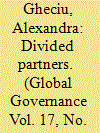

|
|
|
|
|
| Publication |
2011.
|
| Summary/Abstract |
In this article, I examine the challenges associated with the cooperation
between NATO and nongovernmental organizations in peacebuilding operations.
I argue that those challenges need to be understood as part of
a process of contestation and competition over the redefinition of the
"rules of the game" in the changing domain of peacebuilding. This
process of contestation, I suggest, can significantly undermine NATO's
ability to contribute to sustainable peacebuilding in war-torn countries.
|
|
|
|
|
|
|
|
|
|
|
|
|
|
|
|
| 18 |
ID:
180561
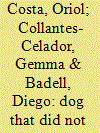

|
|
|
|
|
| Summary/Abstract |
The cosmopolitan character of the International Criminal Court (ICC) is not immune to the growing surge in the contestation of international institutions. The African Union’s reaction to the ICC decision to indict the then sitting heads of state of Sudan and Kenya, and the actions undertaken by the Trump Administration against the Court over possible investigations into Afghanistan and Palestine, are cases in point. This article explores what that surge has meant for intra-EU debates on its position towards the ICC. We present a two-fold argument based on an empirical analysis of key moments in the institutional development of the Court that coincide with the pre- and post-rise phases in the politicisation of international institutions. First, the level of agreement on the ICC within the EU has been grossly exaggerated. Second, despite bouts of disagreement, patterns of political conflict over the ICC within the EU remain constant. That is, there is recurrent polarisation, with a range of opinions on the intractable debate about Westphalian sovereignty vs. cosmopolitan justice, but no change in the other two dimensions of politicisation (salience and actor range).
|
|
|
|
|
|
|
|
|
|
|
|
|
|
|
|
| 19 |
ID:
194848


|
|
|
|
|
| Summary/Abstract |
This article problematises ‘sainthood’ as a sacred spiritual construct by the understanding and appropriation of the same. We have examined claims of Chishti and Dhuddi biraderies (endogamous kinship groups) as spiritually elevated and socially superior groups based on our recent fieldwork in three villages in the district of Vehari, Punjab. We take a case study of Chishti biraderi’s claims of spiritual ascendency because of their descendance from Shaykh Farid (d. 1265 CE). Chishties’ position as chosen ones is contested by Dhuddi biraderi who claim their descendance from an equally famous Sufi saint Dewan Baba Haji Sher (d. 752 CE). Our research shows how claims of saintly kinship reflect the power struggle in rural Punjab where the appropriation of saintly kinship as well as contestations of similar claims are advanced by zamindar (land owner) patrons to reproduce their position of power and privilege.
|
|
|
|
|
|
|
|
|
|
|
|
|
|
|
|
| 20 |
ID:
180560
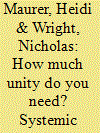

|
|
|
|
|
| Summary/Abstract |
The Common Foreign & Security Policy (CFSP) is a transnational policy framework to deliver collective foreign policy and also to manage differences among member states. As such, it has always been dependent on their support. Since 2019, however, disagreement within this system is said to have reached a new level. Taking this political trend as our starting point, this article proposes a new, conceptual approach to understanding how contestation challenges the EU’s foreign policy cooperation system. While the majority of research focuses on disagreements in decision-making, we argue for a broader conceptualisation – systemic contestation. Drawing on norm contestation scholarship, we argue that systemic contestation manifests itself in two ways: as passive contestation, when member states disengage from and fail to take ownership of CFSP initiatives and their implementation; and as tacit contestation, when they fail to act when faced with the need to safeguard the system. This approach accounts for the transgovernmental character of the CFSP; and the central role of member states within it. Finally, we contend that our conceptualisation of systemic contestation offers promising new avenues for empirical research to understand the “black box” of EU foreign policy cooperation.
|
|
|
|
|
|
|
|
|
|
|
|
|
|
|
|
|
|
|
|
|